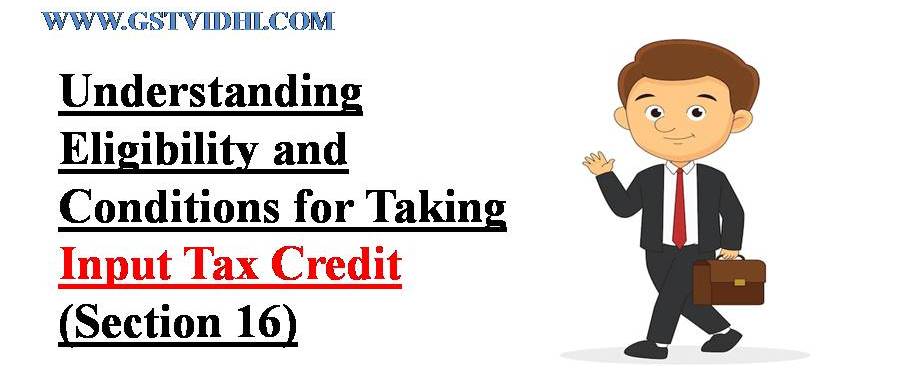
Eligibility And Conditions To Claim Input Tax Credit Under GST (Section
16 Of CGST Act)
Input Tax Credit (ITC) is
a fundamental concept under GST that allows registered businesses to claim
credit for the tax paid on purchases used in the course of business. This helps
avoid tax cascading and ensures only the value-added portion is taxed.
Who Can
Claim Input Tax Credit?
Registered Business
Owners: If you are registered under GST, you are eligible to
claim credit for the input tax (tax paid on purchases) on goods or services
used for business purposes. The credited amount gets reflected in your
electronic credit ledger.
Conditions
to Claim Input Tax Credit
To be eligible for ITC
under Section 16(2), you must fulfill the following essential conditions:
- Valid Tax Documents:
You must possess a tax invoice, debit note, or any other prescribed tax
document issued by a registered supplier.
- Invoice Reporting by Supplier:
The supplier must furnish the invoice or debit note in their GSTR-1
return, which should also be reflected in your GSTR-2B.
- Receipt of Goods or Services:
You should have actually received the goods or services. Even if the goods
are delivered to another person on your instructions or the services are
provided to a third party as directed by you, it is deemed as received by
you.
- No Restriction in GSTR-2B:
The ITC should not be restricted under Section 38, which deals with the
communication of inward supplies and credit availability.
- Tax Payment by Supplier:
The supplier must have paid the tax charged on the supply to the
government, either in cash or using their input tax credit.
- Return Filing by Recipient:
You must have filed your GSTR-3B return under Section 39 to claim the
credit.
Special Situations
Goods
Received in Installments:
If you receive goods in
lots or installments, you can only claim the input tax credit when the last lot
or installment is delivered.
Delayed
Payment to Supplier (180-Day Rule):
If you fail to pay the
supplier within 180 days from the date of the invoice, the ITC claimed
must be reversed along with interest. However, you can reclaim
the credit once the payment is made.
Depreciation
and ITC
If you claim depreciation
on the tax component of capital goods under the Income Tax Act,
you cannot claim ITC on that tax amount under GST.
Time Limit
to Claim ITC
You cannot claim ITC
for any invoice or debit note after the earlier of the following two
dates:
- 30th November
of the following financial year, or
- Date of filing the annual return
(GSTR-9) for that year.
Example:
For an invoice dated 15th March 2024 (FY 2023–24), ITC must be claimed by 30th
November 2024 or the date of filing GSTR-9 for FY 2023–24, whichever is
earlier.
Exceptions
for Earlier Years
As per government
notifications and clarifications, for the financial year 2017–18, ITC
could be claimed up to the March 2019 return filing deadline, provided
the relevant invoices or debit notes were reported by the supplier within that
time.
Conclusion
This simplified guide
highlights:
- Who is eligible to claim Input Tax
Credit (ITC),
- Key conditions that must be
fulfilled,
- Special cases such as
installment-based receipt, delayed payments, and depreciation, and
- The strict time limits for availing
ITC.
Staying compliant with
these provisions helps ensure that your business can benefit fully from the ITC
mechanism without the risk of reversal, penalties, or interest.
Disclaimer: All the Information is strictly for educational purposes and on the basis of our best understanding of laws & not binding on anyone.
Click here